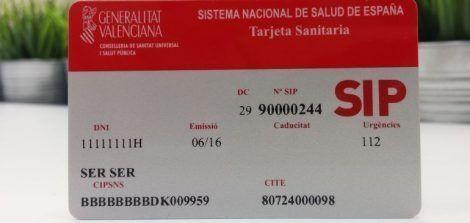The Spanish Healthcare System for UK nationals Living in Spain
Spanish Healthcare System - How to get state healthcare if you live, work or study in Spain.
If you need a Drs appointment Make one ONLINE HERE
Sanidad makes the "Patient Portal" available to citizens on its website
With a single click you can access services that will avoid travel and waiting Pending appointments can be consulted, not only in Primary Care but also with each specialist.
The Department of Universal Health and Public Health have developed a section on the website called "Patient Portal" which collects , on a single page, the sections most consulted by citizens, that have to do with the health care they receive.
The Patient Portal offers a much more visible and accessible usability experience. In the portal you will find different sections such as, make an appointment at the health centre, see pending appointments, it also gives you direct access to the "SIP Health Card" section where you can change your details or request the renewal of your health card and check you Electronic Health History.
Consult the "Patient Portal Here, all you need to do is entre your SIP number and date of birth
What should I do if I suspect I have COVID-19 symptoms, or if I’ve been in contact with someone infected?
First, avoid all physical contact with other people. Next, inform the local healthcare authorities immediately via the information helpline. The number for the Valencian region is 900 300 555
Stay at home for 10 days if you have either:
- a high temperature
- a new continuous cough
This will help to protect others in your community while you are infectious.
Do not go to a GP surgery, pharmacy or hospital
Information updated 1st January 2021 - General information
The Spanish Healthcare System
You need to make sure you are correctly registered for the Spanish healthcare system as a resident in Spain.
All residents in Spain need to register to access healthcare.
At the moment, UK nationals usually access the Spanish national health system in one of these ways:
Through entitlement to healthcare as a permanent resident if they’ve lived in Spain for 5 years (resident before 2012 were/are legally entitled to free healthcare)
Through entitlement to healthcare if they’re employed or self-employed in Spain
Paying directly into the public health insurance scheme (Convenio Especial)
Registering a UK-issued S1 form with the social security office
Using a European Health Insurance Card (EHIC) or Global Health Insurance Card (GHIC) for temporary stays
Once registered for healthcare, basic state services are free, but there are some things that patients need to pay for. For example, you usually have to pay something towards prescriptions – either a reduced price or the full price.
Spanish Healthcare system if you live and work in Spain
Healthcare if you live and work in Spain
If you’re working or self-employed in Spain, you’re entitled to state healthcare on the same basis as a Spanish citizen. Your dependants are also entitled.
Register at your local health centre with your social security number. You can get a social security number from your local National Social Security Institute (TGSS) office in Spain.
Your dependants need to register separately.
Once you’ve registered, you’ll get a health insurance card. Take it with you whenever you visit a doctor.
You may be entitled to a Spanish EHIC for travel, including visits to the UK.
You may also have the right to apply for a UK S1 if you start drawing a UK State Pension.
Spanish Healthcare system if you’re a permanent resident
If you’ve been a resident in Spain for 5 years or more, you can apply for permanent residency. This will give you access to state healthcare on the same basis as a Spanish citizen.
Once you’re a permanent resident, you need to register for healthcare at your local INSS office. They will give you a document which you need to take to your local health centre.
If the UK pays for your healthcare, for example through an S1 form, you cannot register for healthcare as a permanent resident.
If you are not a permanent resident and you are not working but need healthcare in Spain
You can apply to join the public health insurance scheme. This is called the Convenio Especial. You pay a monthly fee to join the scheme, which gives you access to the Spanish health system.
You can apply if you’ve been registered on the ‘padrón’ (at your local town hall) for at least one year.
If you’ve lived in Spain for less than one year and cannot get healthcare cover, you’ll need to buy private health insurance.
If the UK pays for your healthcare, for example through an S1, you cannot join the Convenio Especial.
Spanish Healthcare System
The Convenio Especial
The Convenio Especial is a pay-in scheme which allows you to access state healthcare in Spain.
HOW MUCH DOES IT COST?
You will pay a monthly fee of 60 euros (under 65 years old) or 157 euros (over 65 years old).
Be aware that your prescription costs aren’t subsidised on this scheme, so you will pay full cost for prescription medicine. You won’t be eligible for a European Health Insurance card
WHO CAN APPLY FOR THE CONVENIO ESPECIAL?
You can apply for this scheme if you aren’t eligible to access to state healthcare, for example as a worker or pensioner.
You need to have been living in Spain for a minimum of 12 months, and have been registered for 12 months with the town hall (padrón).
You are still eligible for the Convenio Especial if you have pre-existing conditions, so if you can’t get private health insurance because of your medical history then this is a good option for you.
If the UK pays for your healthcare, for example through an S1, you cannot join the Convenio Especial.
HOW DO I APPLY?
You can find out how to apply in your region below. If your region isn’t listed, please check with your nearest health centre. For further information about the application process, please contact the authorities in your region (via the links below).

Spanish Healthcare System if you’re a dependant of someone living or working in Spain
Dependants and family members are classified differently in Spain than the UK.
Find out who’s considered a dependant under Spanish law.
If you classify as a dependant of someone entitled to state healthcare in Spain (because they’re either working in Spain, a permanent resident or receiving Spanish benefits) you’ll need to apply at your local INSS office.
You’ll also need to show a letter stating that you are not covered by the UK for healthcare (documento de no exportación). You can request this by calling NHS Overseas Healthcare Services.
NHS Overseas Healthcare Services
Telephone: +44 (0)191 218 1999
Monday to Friday, 8am to 6pm
Saturday, 9am to 3pm
Spanish healthcare system - If your UK employer has sent you to Spain temporarily (‘posted workers’)
A posted worker is someone who is employed or self-employed in the UK, but temporarily sent to another European Economic Area (EEA) country.
UK posted workers can access healthcare in Spain using a UK-issued EHIC or an S1 form if Spain opts in to posted worker arrangements as a part of the agreement with the EU. Spain will need to confirm this by the end of January 2021.
If Spain does not opt in to posted worker arrangements, you may need to do one or more of the following:
- join a local healthcare scheme
- cover the cost of your healthcare with private health insurance
HMRC has a helpline for National Insurance enquiries from non-UK residents. They can answer questions about posted worker status and explain which documents you will need to get healthcare while posted.
UK-funded healthcare: using an S1 form in Spain
There’s different guidance if you’re a posted worker.
You may be entitled to state healthcare paid for by the UK if you’re a Spanish resident and receive a UK State Pension.
You may also be entitled to an S1 form if you’re a frontier worker (someone who works in one state and lives in another). You must contact HMRC National Insurance enquiries to find out if you’re eligible.
If you were living in Spain before 1 January 2021, you may also be entitled to an S1 if you receive some other ‘exportable benefits’.
Not all UK benefits that can be claimed while abroad entitle you to UK-funded healthcare. Read more about claiming benefits if you move abroad or contact Jobcentre Plus to ask about a benefit.
When you get your S1 form, you must register it with your local social security office (INSS).
This will mean you and your dependants will be entitled to state healthcare on the same basis as a Spanish citizen.
You’ll also get:
- a UK-issued EHIC for travel
- planned treatments in other EU countries
If you moved to the EU before 1 January 2021, you’ll have access to the NHS in England when you’re visiting.
How to get an S1 form
If you have a UK State Pension, you must request an application form by phone from the Overseas Healthcare Services. This is part of the NHS Business Services Authority (BSA).
NHS Overseas Healthcare Services
Telephone: +44 (0)191 218 1999
Monday to Friday, 8am to 6pm
Saturday, 9am to 3pm
How to use an S1 form in Spain
You must register your S1 at your local INSS office.
The INSS will give you a Spanish social security number. Take this to your local healthcare centre to register.
You’ll be given a medical card which you can use when you visit a doctor.
Spanish Healthcare System if Studying in Spain
You can use an EHIC or GHIC to get medically necessary healthcare until the end of your study period.
Moving back to the UK
If you return to the UK permanently you will be able to use the NHS like any other UK resident.
Going to the doctor in Spain
In Spain, you get primary heath care through a health centre (centro de salud or centro de asistencia primaria or CAP), or a general doctor (médico de cabecera). Before you can see a doctor, you’ll need to register (see above).
Find your local health centre. The health centre will probably have around six doctors and you may not see the same one each time you visit, although in some centres you can book to see the same doctor, particuarly if you are in ongoing treatment. Find a doctor with his or her own practice through the phone book or by personal recommendation.
Doctors may offer both private and state healthcare; make sure you are clear which type of healthcare you want. There may be separate surgery times for private and state patients. You should be given a leaflet called Carta de Derechos y Deberes (Charter of Rights and Obligations) that sets out your rights as a patient. You usually make an appointment to see a doctor at a health centre although doctors with individual practice may offer a first-come-first-served basis. You have the right to be accompanied by a friend or relative during consultations. You can change doctors easily, just by re-registering.
Going to see a specialist
If you want to be seen by a medical specialist in Spain you’ll need to be referred by a family doctor. If you have private health insurance, you’ll be able to see a specialist much faster than going through the public system.
Hospitals
In an emergency you can go straight to a hospital A&E or ER (Urgencias).
If you want to get any other type of hospital treatment, you’ll need a referral from a doctor. There are public and private hospitals. Only the public hospitals provide free treatment. Some hospitals offer both private (privado) and state healthcare services (asistencia sanitaria pública), so make sure the staff knows which service you want.
When you go to hospital you’ll need to show your social security card or proof of private insurance.
If you are discharged from a hospital and need medication, you have to take the hospital medical report to a pharmacy for the prescription to be fulfilled, as hospital doctors don’t issue prescriptions.
Pharmacies in Spain
You can take a prescription to any pharmacy (farmacia). Look for a shop with a large green cross sign outside.
Pharmacy opening hours
Pharmacies are usually open Monday to Friday from 9.30am to 2pm and 5pm to 9.30pm, and Saturdays 9.30am to 2pm. There’s usually a notice on the pharmacy window or door with details of the nearest 24-hour pharmacy (farmacia de guardia) – or you can find a list of pharmacies online.
Prescription charges in Spain
You have to pay a percentage of the cost of prescription medicines, and the cost is non-refundable. How much you pay depends on your income and whether you are of working age or a state pensioner. For example.
If you are a pensioner with a non-contributory pension or have a minimum income, you will not have to pay anything for your medicines.
If you earn less than 18,000 euros per year, you will pay 10 percent of the price of medicines, with a maximum of 8 euros per month.
If you earn more than 18,000 euros per year, the maximum will be 18 euros per month.
Pensioners with an income of over 100,000 euros per year will pay 60 percent of the medicines, with a limit of 60 euros per month.
If you are working and you have an annual income of less than 18,000 euros, you will have to pay for 40%
If your income exceeds 18,000 euros but is less than 100,000 euros, you will pay for 50%
If you earn more than 100,000 euros a year, you will pay 60%
If you are unemployed you will no longer have to pay any the drugs.
You can find out more about this co-payment system, in Spanish, here.
Registered pharmacists can also provide health consultations and guidance on health matters.
Visiting the dentist in Spain
Dental treatment is not covered by the state healthcare system unless in an emergency. You must either pay for dental treatment unless you have private health insurance. Find a dentist by looking in the phone book or by personal recommendation. Just call up and make an appointment.
Pregnancy and birth in Spain
The standard of care for pregnant women in Spain is highly regarded in both the private and public sectors. The degree of medical contact is reasonably high, with an initial appointment with a doctor or midwife (comadrona/llevadora) to confirm the pregnancy, antenatal appointments and hospital scans. Most births take place in a hospital although home births are becoming increasingly popular. A word of warning: if you wish to give birth at a private clinic, it’s advisable to take out medical insurance well ahead of getting pregnant otherwise it might be hard to find an insurer.
In an emergency
In a serious, life-threatening emergency, call the number 112 free of charge from any mobile/cell phone or landline. The Spanish word for A&E or ER is urgencias.
Other emergency numbers include:
- 060 for an ambulance (ambulancia)
- 961 496 199 – emergency dentists
- 963 600 313 – on duty pharmacy
Useful Spanish phrases in an emergency
- Accident: Accidente
- Emergency: Emergencia/Urgencia
- I need an ambulance: Necesito una ambulancia
- I need a doctor: Necesito un medico
- Heart attack: Ataque cardiaco/Infarto
- Stroke: El accidente vascular cerebral
- I need a dentist: Necesito un dentista
The above information has been provided by the UKGOV and is up to date at the time of publication.
Spanish Healthcare System General Questions and Answers
Where do I get my SIP card from?
Your SIP card is issued at your local Medical Centre.
How do I find out which Medical Centre I should be registered with?
You should call Infosalut on 900 161 161.
How do I change personal details or address. Where do I contact for a new card if lost, stolen, damaged etc
Visit your Local Medical Centre or call the Information Help Desk on 900 662 000
Who do I notify of changes in circumstances ie from working to retired?
Visit your local Medical Centre, and present an updated photocopy of Annex I, which will have been provided by the Instituto Nacional de la Seguridad Social (INSS). In the case of a different accreditation change, please provide the supporting documentation.
Where do I notify a change of registration (Empadronamiento/Padron)?
Visit your local Medical Centre and present the new Certificate of Registration.
I am contributing to Social Security and I am going to travel outside of Spain (to a European Union country). Where do I apply for the European Health Insurance Card (EHIC)?
You can call the INSS Information Telephone Number on 900 166 565 or visit the CAISS Social Security Information Centre.
Could I be refused medical care in Spain if I'm not registered as a resident and have no health card?
If under the age of 18, you are entitled to the same attention as any Spanish citizen. Assistance in pregnancy, childbirth and postpartum is also guaranteed.
People who are not entitled to the card will be attended to in case of emergencies due to illness or accident.
If you are refused treatment at your local health center or public hospital when underage, pregnant or in the event of an emergency, you can make a formal complaint in writing by asking for the “Hojas de Reclamaciones”, (book of complaints).
For general questions about my Health Insurance, where can I call?
Please contact the Help Desk on 900 66 2000.





